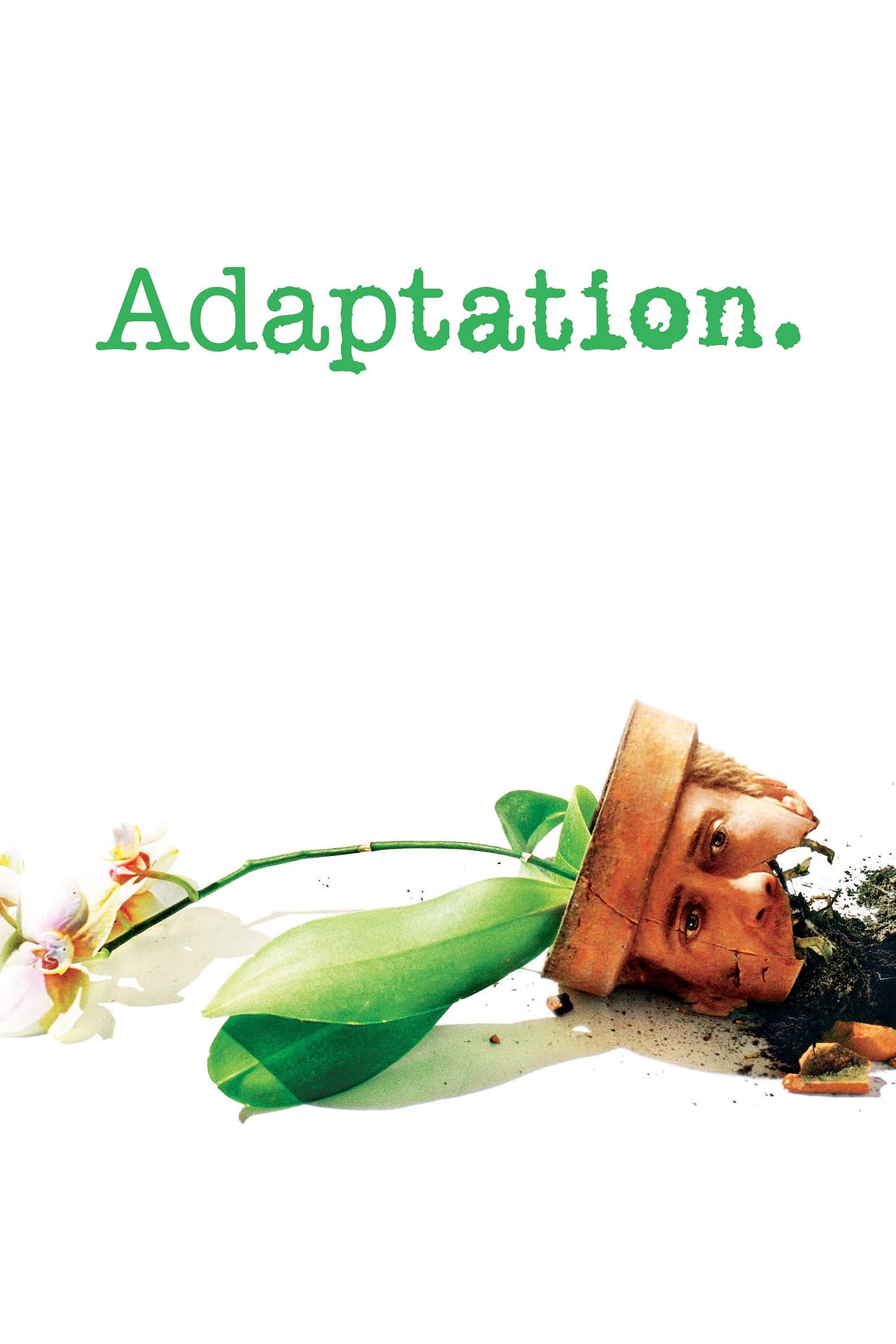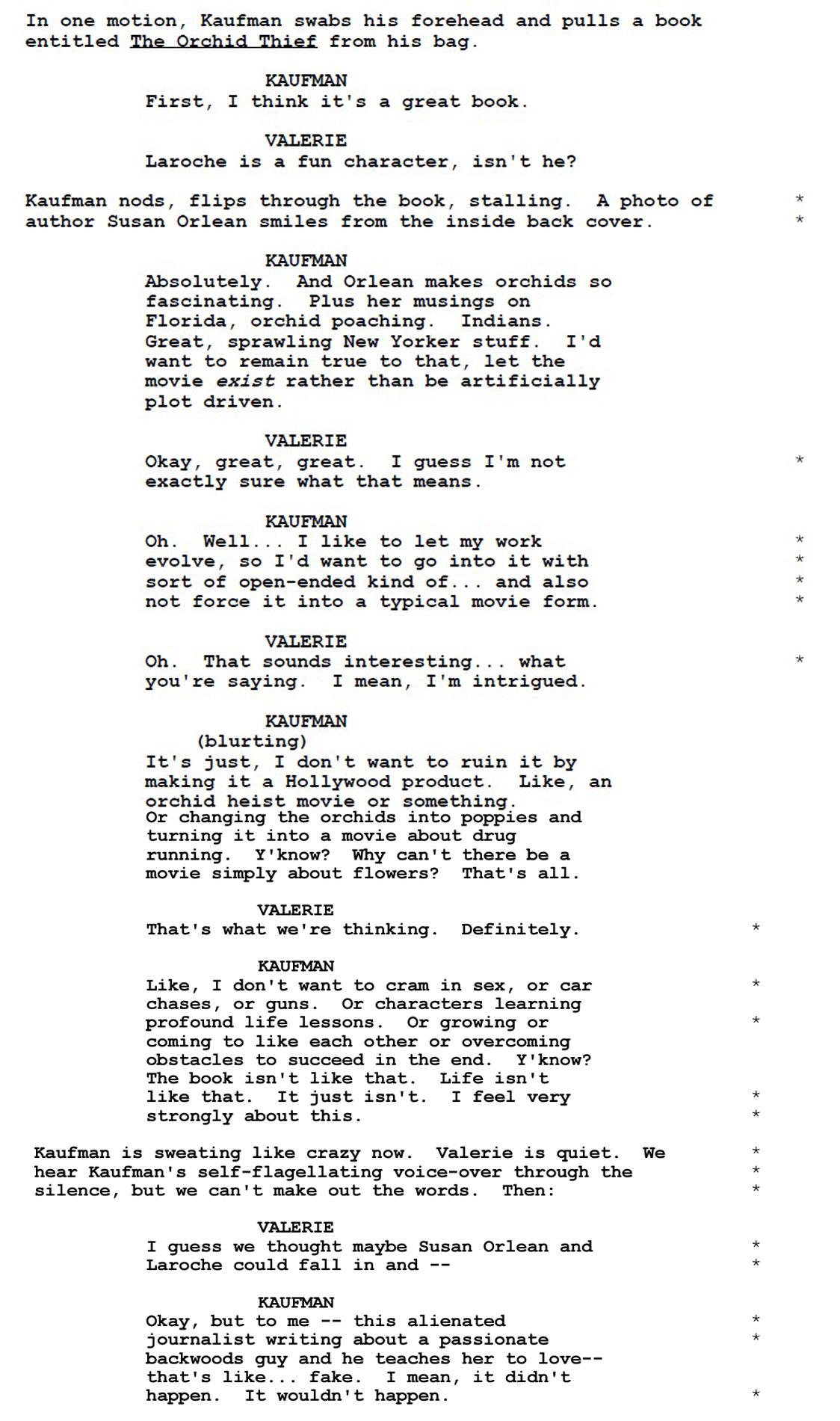Adaptation. (2002) Script Review | #11 WGA 101 Greatest Scripts of the 21st Century
Irreverent, gleefully meta, and wildly funny, Charlie Kaufman delivers a truly original script for the ages.
Logline: A lovelorn screenwriter becomes desperate as he tries and fails to adapt “The Orchid Thief” by Susan Orlean for the big screen.
Written by: Charlie Kaufman and Donald Kaufman
Based on: “The Orchid Thief” by Susan Orlean
Pages: 129
Scenes: 227
That Adaptation. even got made beggars belief; that it remains known in wider circles instead of being a niche gem is more astounding still! An appropriate reaction, for the screenplay is just as baffling, yet compelling. It shouldn’t work, and yet somehow, writer Charlie Kaufman makes it come alive by taking a meta-approach to it while remaining fictitious.
Case in point: On the title page, the screenplay is credited to Charlie Kaufman and Donald Kaufman. Except Charlie doesn’t have a brother named Donald! That’s only the beginning. The story is about Charlie Kaufman trying and failing miserably to adapt The Orchid Thief by Susan Orlean as a screenplay. He spends most of his time instead being chronically anxious about his weight and his baldness, and masturbating. It doesn’t help that his twin brother, Donald (!), wants to make it as a screenwriter, too, by writing a serial killer thriller, and is somehow getting attention in the industry for it. Meanwhile, we follow John Laroche and his exploits stealing rare flowers as described by Susan Orlean, who falls in love with him and abandons her writing career to be with the orchid thief.
If at any point you’re wondering what part of this script is real and what isn’t, you should first know that none of the actual events are real; nor are the fictionalized takes on real people. Besides not having a twin brother, Kaufman is neither fat or balding— he also did not have a love interest, as he was already married at the time (as to whether he spent more time rubbing one off instead of writing, I’ll leave that up to you). Other fictionalized real people in the script are Valerie Thomas and Marty Bowen— the former was the executive who hired Kaufman to adapt The Orchid Thief; the latter was Charlie Kaufman’s agent at United Talent Agency before he became a prolific producer after the mid-2000s. Bold? Bold! But no real person is as memorably fictionalized as screenwriting guru, Robert McKee, who makes an impressionable appearance around page 87 to give Kaufman a jolt to his systems and beliefs.
The question that one asks while reading this is: What on earth is going on? Here’s what happened.
When Kaufman accepted the assignment for the Orlean book, he hadn’t anticipated the struggle he was going to have in adapting it. He didn’t want to turn it into a formulaic film, but he also couldn’t see how to make it work. At the same time, he didn’t want to give up. Finally reaching an impasse, Kaufman suddenly had a wild thought: What if the script was about his struggles to adapt The Orchid Thief? Rather than pitching it to the studio (who would have flatly refused because can you imagine trying to explain it?), he only told Spike Jonze about his brainwave during filming on Being John Malkovich—who didn’t criticize him— and went ahead and wrote it anyway. Despite its unusualness, everyone bought into it.
Well, almost. When Susan Orlean first read the screenplay, her reaction was complete shock, and she refused to give her permission. Somehow, the crew managed to work around it and after the film’s release and portrayal by Meryl Streep, Orlean came around and even appreciated what Kaufman had written.
These are the words that Kaufman uses to describe what he’s trying to attempt; Orlean points out that he had honed in on the book’s themes of life and obsession, as well as the more subtle insights about longing and disappointment. Themes, that, looking over his filmography, crop up frequently in Kaufman’s body of work. Adaptation., though, is just something else altogether. I’m surprised it lost the Academy Award for Best Adapted Screenplay to The Pianist, which isn’t even on the WGA List of 101 Greatest Screenplays of the 21st Century. (Kaufman would have the last laugh: both this and Eternal Sunshine of the Spotless Mind have endured as cinematic touchstones.)
For instance, it’s really funny. Even though Kaufman tends to get mislabeled for writing depressing stuff, it’s easy to forget that he got his early start writing parodies for National Lampoon and working on sketch comedies such as The Dana Carvey Show, so it’s natural for humor to be a major part of his style. This also applies to the bonkers third act which sees the Kaufman twins teaming up to meet Orlean, only to wind up in a car chase with the author and Laroche. In other words, it becomes exactly the kind of movie that Kaufman was trying to avoid when he met Valerie— filled with sex, car chases, and guns!
Although Adaptation. might seem confusing occasionally, it certainly isn’t boring. No matter how alien it might feel, there’s something instantly recognizable in the plight of a lonely writer attempting to write something good. The existence of this screenplay offers some comfort that not even the most sophisticated artificial intelligence program would be able to spit out something as unique, original, and even as exasperating as what Kaufman has written.
Notes:
Desowitz, Bill (August 18, 2002) | Development players make personal choices (Variety)
D. Spence (December 5, 2002) | Spike Jonze and Charlie Kaufman Discuss Adaptation (IGN)
Fleming, Michael (November 14, 2002) | What will follow film success for Eminem? (Variety)
Perry, Kevin EG (April 16, 2012)) | The New Yorker’s Susan Orlean on crafting a story and being played by Meryl Streep in Adaptation (GQ) https://www.gq-magazine.co.uk/article/susan-orlean-adaptation-orchid-thief-rin-tin-tin




